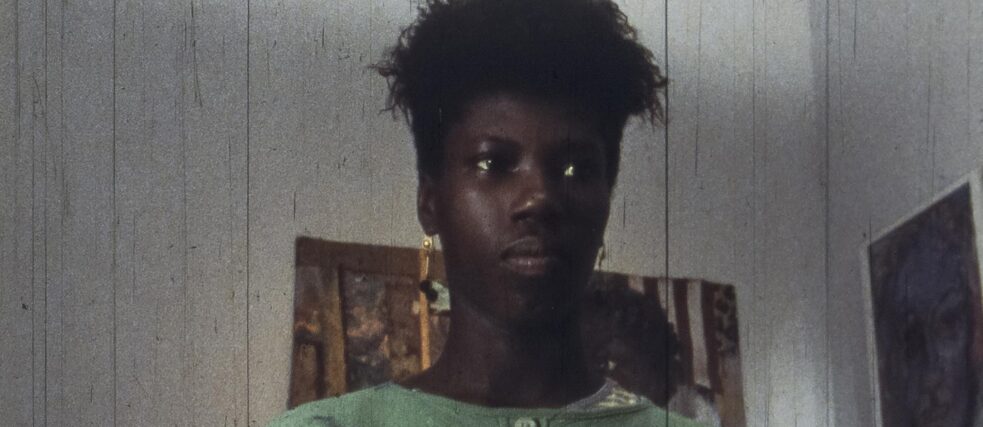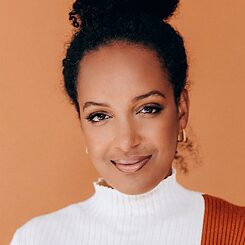Berlinale Bloggers 2023
“I'm all about visibility, accessibility and empowerment“

Benita Bailey has been attending the Berlinale for many years. The festival is the ideal platform for the German-Ethiopian artist to network and campaign for safe spaces and the participation of marginalised groups. In the interview, she talks about her numerous activities – and the window of time she still has for the films on the screen.
 Photo (detail): © Phanie Étier
Benita Bailey is an actor (Die Pflegionärin; Maya Rising; The Ordinaries) and filmmaker (Heirs). Born in Rudolstadt, Thuringia, she lives in Toronto and Berlin. She also is part of Schwarze Filmschaffende e.V. (Black Artists in German Film), a professional association for directors, producers, screenwriters, actors and actresses who are Afro-Germans or of African origin. Moreover Benita produces and hosts the video interview series #YellItFromTheMountain, featuring German and Canadian Black performing artists.
Photo (detail): © Phanie Étier
Benita Bailey is an actor (Die Pflegionärin; Maya Rising; The Ordinaries) and filmmaker (Heirs). Born in Rudolstadt, Thuringia, she lives in Toronto and Berlin. She also is part of Schwarze Filmschaffende e.V. (Black Artists in German Film), a professional association for directors, producers, screenwriters, actors and actresses who are Afro-Germans or of African origin. Moreover Benita produces and hosts the video interview series #YellItFromTheMountain, featuring German and Canadian Black performing artists.
How often have you been at the Berlinale?
This is my 9th Berlinale. The first time I came to see some competition films was while I was studying acting in Berlin. It was like watching a preview of what could potentially lie ahead of me for my future. A thrilling and exciting feeling to witness film premiers in the Berlinale Palast. At Berlinale, I discovered my love for European cinema and its makers.
An internationally working actor cannot miss the Berlinale ...
...because it's a good place to get to know and connect to the European film industry. It is the most important film festival for me, and it is considered one of the most important events in the film industry worldwide. It is exciting to see premieres of international films but most importantly connect with international filmmakers.
What does a day at Berlinale look like for you?
I spend the mornings at European Film Market, working; having meetings with directors, filmmakers and producers. As of the afternoon, I am participating in events and panels or go to reception. I go to screenings if I have some time left. This year I have four to five Berlinale events per day in my calendar – that's without screenings.
There’s a lot of talk about change (or not) in the film industry and festival circuit. The Oscars are just getting criticized for their male-focused selection. What movement (or lack thereof) do you see, in terms of diversity and gender equality, at Berlinale?
I think that the reality of life in our society is not portrayed in film and television in a fair manner at this point. I have been involved with ProQuote – a gender equity advocacy group – moderating or discussing equal rights for womxn and inclusion for years now. This year, I’m leading a panel on the topic of the compatibility of family and work in the film industry. We are also having our annual Black Filmmakers Berlinale Meet-Up. I started these get-togethers half a decade ago in order to have us come together, network and to empower each other. We are way more than we even knew ourselves in this industry and it’s important that we stand together. With regard to the Berlinale, even in recent years the lack of diversity in all spaces: receptions, red carpets, competition jury and of course on screen has been very tangible. The Fiktionsbescheinigung program is a step in the right direction. The series is dedicated to the work of Black directors and directors of colour in Germany, seeking to incorporate intersectional perspectives into German film historiography.
Curators like Karina Griffith have managed to program some films from Black German artists that never received the attention they deserved, such as Sheri Hagen’s film At Second Glance which was part of Fiktionsbescheinigung 2021. In general, there is much work to still. When I look at the heads of all Berlinale sections – they are all white and they have to sole power to decide which film will be programmed despite working with a team of programmers.
How can a BIPOC filmmaker feel safe? I think there needs to be more diversity in all decision-making positions of the Berlinale, and when I speak of diversity, I mean people of a global majority that are still oppressed and lack access in the current system. Another issue I found is that I can’t understand why not all Berlinale events are translated in sign language. It’s a publicly funded event that should be accessible for everyone in the industry.
What is the most important engagement you’ll have for/with Black artists at Berlinale?
Every year, it is important for me to join the community of Black filmmakers. Schwarze Filmschaffende e.V. is a network of Black filmmakers in German-speaking countries with and without a history of migration. Together we stand up for equal opportunities and diversity, in front of and behind the camera. As well as for a non-discriminatory education at film schools and other educational institutions. I am all about visibility, accessibility and empowerment.
As soon as I leave the Berlinale 2023, I will …
…fly back to Toronto. The Berlinale is an insanely stressful time and it’s not rare to have your body shut down entirely after the festival. So I’m looking forward to some calmer days with my family in Toronto and going for a little ski trip during March break. Only to fly back to Berlin for a solo performance, shooting Real Man a film dealing with mental illness within the Black community, and producing the 4th season of “Yellit”. That’s all I can reveal at this point, more to come.
The interview with Benita Bailey was conducted by Jutta Brendemühl, programme curator at the Goethe-Institut Toronto and blogger at German Film @Canada. Slightly abridged version of the original English text.